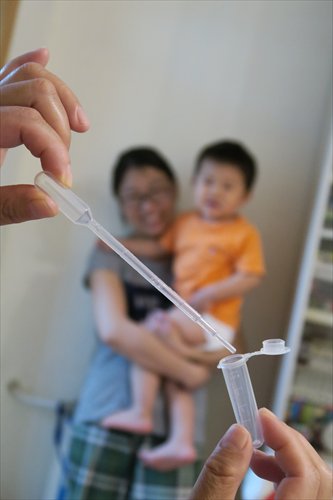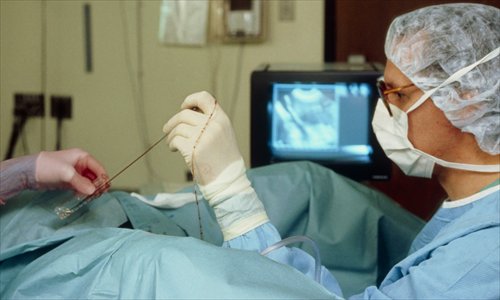HOME >> METRO BEIJING
Overseas fertility clinics are offering new hope for prospective parents – but are they trustworthy?
Source:Global Times Published: 2016-5-24 19:38:01

More Chinese couples are heading to overseas clinics to get IVF, both because they offer shorter waiting times, and because they allow patients to choose the gender of their baby. Photo: Li Hao/GT
Last month, Nanfang Daily released a story about 43-year-old Li Duo (pseudonym), who already has a daughter but recently became obsessed with the notion of bearing a son to continue their family line. Considering the fact that gender selection is illegal in China - not to mention that, at 43, Li is already past her prime child-bearing years - it seemed like a pipe dream. Until, that is, she discovered that fertility clinics in Thailand offer IVF (in vitro fertilization), which would not only allow her to get pregnant at such a late age, but would allow her to choose the sex of her baby.
Yet, after several visits to Thailand, and procedures that cost her upwards of 1 million yuan ($152,600), Li still wasn't seeing any signs of pregnancy. So she turned to a Chinese hospital for a checkup, only to be told that due to her age, coupled with the fact that she suffers from lupus erythematosus, an autoimmune disease, she couldn't carry a baby at all. That meant that all the trouble she went through, and the money she spent, were in vain.
Since last year, when China's long-held one-child policy was phased out, more and more older couples have been seeking out IVF in hopes of having a second child. Around 90 million people in China qualify to have a second child, and half of them are between 40 to 49 years old, making them good candidates for IVF, according to the Nanfang Daily report.
Though there are plenty of fertility clinics in China, many couples are now heading overseas, after hearing that they offer shorter waiting times, the ability to select the sex of their baby and more advanced technologies.
Yet many patients, like Li, are starting to find out that not all of these clinics are trustworthy. Gong Xiaoming, a gynecologist at Amcare Women's and Children's Hospital in Beijing, commented that patients shouldn't trust overseas IVF clinics blindly, and should choose carefully according to their own situations.


Considering the fact that some online sources tend to exaggerate the success of IVF services, doctors suggest that patients do careful research before choosing. Photos: IC
A growing trend
An increasing number of Chinese people have been going overseas to do IVF in recent years, especially since China completely abandoned its decades-long one-child policy in January.
In response to rising demand, a number of agencies have sprung up across the country to help patients arrange IVF at clinics overseas. According to Anna Yao, the marketing director for once such agency, called Kai Xin Guo, only five of these agencies existed in 2013. Today, there are 50.
"In 2014, our agency received an average of four patients per month," Yao said. "That number has risen to around 15."
According to a Reuters article in December, Australia's Monash IVF Group said that 30 to 40 percent of their patients come from China. Meanwhile, a Xinhua News report in January showed that at least eight out of 10 patients waiting for treatment at the Jetanin Institute for Assisted Reproduction in Bangkok were from China.
The price for IVF procedures overseas is usually much higher than in China. "IVF packages, including plane tickets and accommodation, cost around 168,000 yuan for Thailand and 268,000 yuan for the US. In China, the process costs around 40,000 yuan," Yao said.
Despite of the huge price gap, many Chinese people are still flocking overseas for IVF.
The main reason is that the process is faster and easier in other countries. According to a Beijing Youth Daily report in December, most Chinese hospitals that provide the service are overcrowded, and some patients have to wait as long as a month just to get an appointment. The entire process can range from three months to half a year. In Thailand, by contrast, it can be completed in as little as a month, from beginning to end.
The second reason for heading overseas is that parents can select the gender of the baby.
According to a regulation issued by China's National Health and Family Planning Commission in June 2003, medical staff can't perform gender selection for non-medical reasons when using human reproduction technology.
However, there are three countries that allow patients undergoing IVF to choose their child's gender by discarding fertilized eggs - the US, Thailand and South Africa, according to a report by Reuters in July 2014.
The final reason, cited by Yao, is that overseas clinics purport to offer a higher success rate because they utilize more up-to-date technologies and methods. Most overseas hospitals can guarantee a success rate of 80 percent if the mother is under 35 years old," she claimed.
Avoiding traps
An online search for overseas IVF services yields many results on Chinese search giant Baidu, with many websites boasting of 80-to-100 percent success rates. Take a look at online advertisements for such agencies, and it's clear that their key selling point is being able to offer successful pregnancies to women over 40.
However, Dr Tommaso Falcone, the director of the obstetrics and gynecology department at the Cleveland Clinic in the US, which US News & World Report has ranked as the third best hospital in the country for gynecology, said in the Nanfang Daily report that these success rates are way overblown.
Falcone said in his own clinic, under the best of circumstances, they have a success rate of only about 63 percent, which drops to 60 percent for patients between 35 and 37, and 50 percent for those between 38 and 40.
"There is no way the success rate could reach 80 percent in IVF," Falcone warned in the report, adding that he suspects that these clinics manipulate their numbers by only taking on young patients, or refusing to accept those with complicating conditions or histories of failed IVF.
Other selling points for these clinics also turn out to be untrue. For instance, Ou Xianghong, the director of the reproductive center at the Guangdong No.2 Provincial People's Hospital, said in the Nanfang Daily report that the genetic diagnostics necessary to determine an embryo's gender could lead to the failure of IVF and other risks such as miscarriage.
Ou said that these agencies' claims that women of any age can get pregnant through IVF are deceptive.
"Some agencies let patients think that IVF can fix all. That's misleading," Ou said in the report.
"Age has a big influence on a woman's fertility. Women's fertility drops rapidly after 37, and after 43, the possibility of a woman getting pregnant is only around 5 to 10 percent, and carries a high miscarriage rate… To do IVF, women over 40 have to take pills that stimulate ovulation, which can increase the risks of breast and ovary cancer, and thrombosis. It's a health risk for both mother and the child."
The importance of choosing wisely
Gong told Metropolitan that Chinese patients should be wary of overseas clinics. "In order to attract patients, agencies tend to exaggerate the advantages that these clinics offer. According to my experience, Chinese hospitals offer the same level of technology as overseas hospitals, and the cost in China is much cheaper than overseas," Gong said. "So for just the IVF procedure, Chinese patients don't have to go overseas."
Unless patients want to select the gender of the baby or use a surrogate, both of which are banned in China, Gong said that he doesn't see the point in getting IVF done overseas.
For those who do choose to do IVF overseas, Gong suggests that they select the agency and hospital carefully, and get medical checkups before heading overseas to learn about any potential problems.
Cai Qiang, the president of Saint Lucia Consulting, an agency that helps Chinese patients to see doctors overseas, said in the cnr.cn report that when choosing an agency, customers should ask for the agency's registration documents from the tax and business department, and for the authorization certificate from the foreign clinic or hospital.
Yao also suggested that patients talk to former customers when choosing agencies and search information about overseas clinics online.
"Google their official rankings; hospitals in the US even publicize their IVF success rates. Do comprehensive research, after all, it's a very important decision."
Global Times - Agencies
Newspaper headline: Desperate for a child
Posted in: Metro Beijing